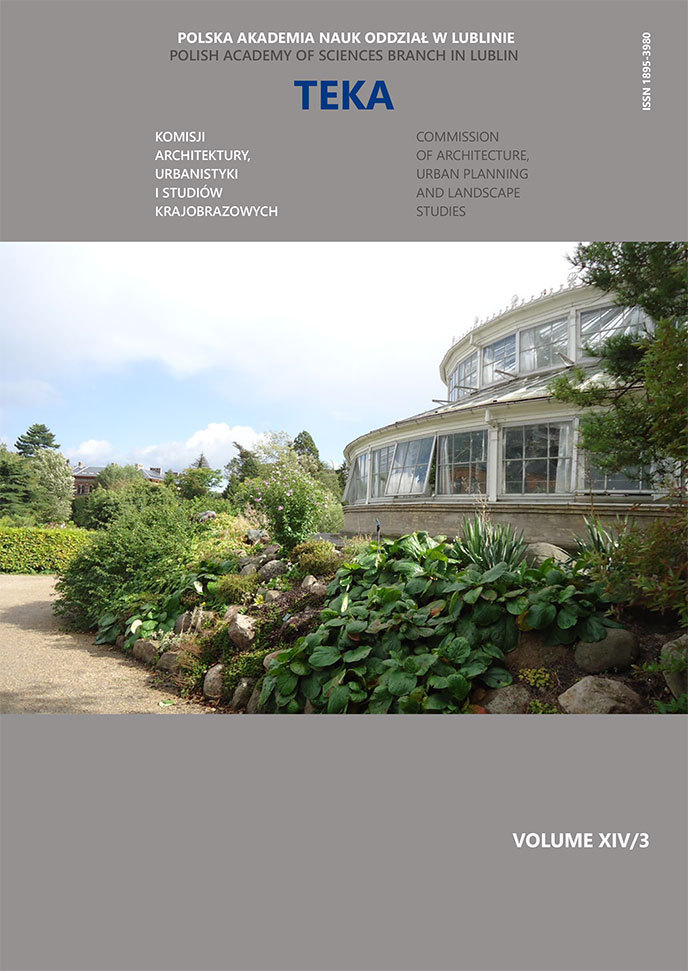“Policyjny Dom Zdrowia” (P.D.Z., Policemen’s Health Center) as the example of a big sanatorium facility in the valley of the Prut River in the Hutsul region
Article Sidebar
Issue Vol. 14 No. 3 (2018)
-
Psychological aspects of architecture and urban planning in crime prevention
Michał Skorupski, Joanna Jabłońska7-14
-
“Policyjny Dom Zdrowia” (P.D.Z., Policemen’s Health Center) as the example of a big sanatorium facility in the valley of the Prut River in the Hutsul region
Jacek Czubiński15-23
-
Adaptive reuse of commercial and public buildings in Wroclaw Old Town in Poland. The occupant’s safety and comfort versus preservation of authenticity of monumental buildings
Krystyna Kirschke, Paweł Kirschke, Elżbieta Komarzyńska-Świeściak24-41
-
Compositional situation: analysis of the location of two sculptures in Mexico City
Leszek Maluga42-49
-
Art in public space as a tool of social inclusion
Agnieszka Chęć-Małyszek50-60
-
Origins of the Kalinowszczyzna district in Lublin: history, design principles and current condition
Michał Dmitruk61-70
-
Emotional reactions of the respondents compared to different ways of perceiving the square in front of the WICA building of the Lublin University of Technology
Olga Skoczylas71-78
-
Psychosomatic aspects of healthcare facility design solutions
Ewa Pruszewicz-Sipińska, Agata Anna Gawlak, Magda Matuszewska79-88
-
Residential buildings in healthcare resort Szczawno-Zdroj in the second-half of 20th century
Marek Piróg89-95
-
Brześć – the city of an eastern borderlands, architecture of the 2nd Republic of Poland
Krystyna Paprzyca96-101
-
Spatial concepts of the work environment
Grzegorz Schnotale102-108
-
The earliest public green areas connected with Jelenia Góra, part. 2
Marzanna Jagiełło, Wojciech Brzezowski109-118
-
The Wrocław urban planning from general plans to studies on land use planning
Robert Masztalski, Piotr Kryczka119-136
-
Architecture of tourist and leisure facilities on the Kłodzko-Orlice borderland, on the example of Zieleniec and Lasówka
Jacek Suchodolski137-155
Archives
-
Vol. 16 No. 4
2020-12-30 11
-
Vol. 16 No. 3
2020-09-30 10
-
Vol. 16 No. 2
2020-06-30 11
-
Vol. 16 No. 1
2020-03-31 10
-
Vol. 15 No. 4
2019-12-30 6
-
Vol. 15 No. 3
2019-10-31 9
-
Vol. 15 No. 2
2019-06-28 12
-
Vol. 15 No. 1
2019-03-29 13
-
Vol. 14 No. 3
2018-10-28 14
-
Vol. 14 No. 2
2018-06-29 14
-
Vol. 14 No. 1
2018-03-30 13
-
Vol. 13 No. 4
2017-12-29 8
-
Vol. 13 No. 3
2017-09-29 9
-
Vol. 13 No. 2
2017-06-30 10
-
Vol. 13 No. 1
2017-03-31 10
-
Vol. 12 No. 4
2016-12-30 12
-
Vol. 12 No. 3
2016-09-30 10
-
Vol. 12 No. 2
2016-06-30 9
-
Vol. 12 No. 1
2016-03-31 8
Main Article Content
DOI
Authors
Abstract
The article presents the building of State Police Sanatorium in Tatarów in the context of other big buildings with timber structure erected ca. 1930 in the valley of the Prut River in the Hutsul region. Several facilities of this kind were constructed there at that time, with total capacity of over 80 visitors at a time. “Znicz” Railwayman Family Association’s guesthouse was commissioned in Tatarów. Tax Officials Society constructed the “Skarbówka” guesthouse in Worochta. In Jaremcze-Jamna, “Gorgany” Health House of the Association of Tax Control Officials of the Republic of Poland began its operations. In mid- 1930s, guesthouse for the Association of Ukrainian Teachers was designed in the same town.
Keywords:
References
Archiwum Akt Dawnych w Warszawie (Archives of Historical Records in Warsaw). Group: Main Police Headquarters in Warsaw [AAD-KGPP], different signatures.
Archiwum Akt Dawnych w Warszawie (Archives of Historical Records in Warsaw). Group: Ministry of Treasury in Warsaw. Policemen’s Health Center Association [AAD-MS], sign. 6432.
Archiwum Akt Dawnych w Warszawie (Archives of Historical Records in Warsaw). Group: Collection of residual groups. Policemen’s Health Center Association 1928−1939, [AAD-ZZS], different signatures.
State Archives of the Ivano-Frankivsk Oblast in Ivano-Frankivsk, [DAIFO], different signatures.
Czubiński J., 2008. Przykłady modernizmu w murowanej architekturze uzdrowiskowej miejscowości Worochta i Tatarów na Huculszczyźnie – zarys problematyki (Examples of modernism in brick spa architecture of the villages of Worochta and Tatarów in the Hutsul region – an outline), [in:] Teka Komisji Architektury, Urbanistyki i Studiów Krajobrazowych, PAN o. w Lublinie (Portfolio of the Commission of Architecture, Urban and Landscape Studies, Polish Academy of Sciences PAN Division in Lublin), Lublin, vol. IV A, 2008, p. 174−195.
Journal of Laws of the Republic of Poland, 1922, No 31, item 254.
Journal of Laws of the Republic of Poland, 1928 No 36, item 331.
Gazeta Administracji i Policji Państwowej (Journal of State Administration and Police), 1924, no 28, (19) 587.
Ilustrowany Kuryer Codzienny. Dodatek Ilustrowany (Illustrated Daily Courier. Illustrated Supplement), 1929, no 46.
Petrowicz T., 1986. Od Czarnohory do Białowieży (From Chornohora to Białowieża). WL, Lublin, p. 77.
Polski Słownik Biograficzny (Polish Biographical Dictionary (PSB), 1978. Vol. XXIII, Ed. PAN, p. 123−124.
Rocznik Policji Państwowej 1927 (State Police Annals 1927). Publishing house of the state police “Na posterunku” (On Post) journal.
Policemen’s Health Center Association 1924−1934, 1935. Warszawa.
Światowid 1929, no 46/1929.
Tygodnik Ilustrowany (Illustrated Weekly) 1930, no 39, p. 820−822.
Article Details
Abstract views: 255


